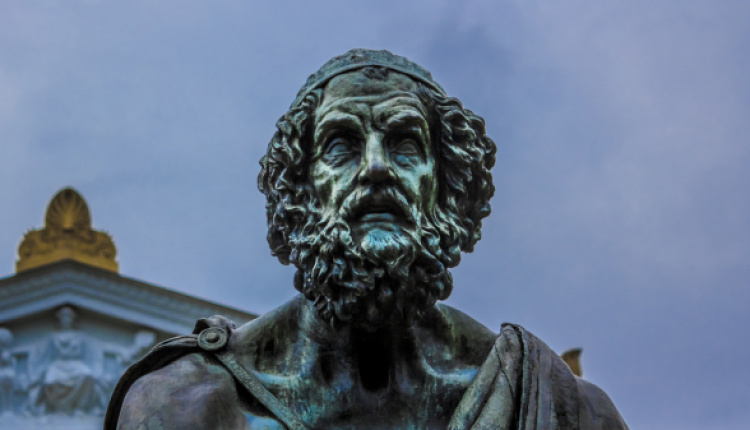Homer & The Continuing Adventure: Conversations With Paul Cartledge
- by XpatAthens
- Monday, 06 January 2025

What makes the Iliad and Odyssey so pivotal to the ancient Greeks, and to world culture in general now? Why so enthralling?
All human life is there. The Greeks being non-dogmatic polytheists didn’t have an equivalent of the Christian Bible or Islamic Qu’ran. But they recognized in the two monumental epic tales not just as entertaining stories (they contain plenty of those!) but also as sources of ethical instruction.
Does The Iliad have a lot to do with the anger of Achilles?
The Iliad’s guiding narrative thread or theme is the anger of the semidivine (his mother was the goddess Thetis, his father a mortal) warrior hero Achilles. Was Achilles justified in feeling so angry with his commanding officer at Troy, angry enough to withdraw from the fighting (and skulk in his tent) thereby endangering the whole operation to recover the stolen Spartan queen Helen of Sparta? Probably not. But he had a good death!
What are some of the lessons of Odysseus’ seemingly endless journey?
And what did the travels and travails of the hero Odysseus, king of a small rocky isle off western Greece, avail – avail either him (he lost all his men on the way back home from Troy) or his readers? What they did was teach the poem’s listeners and later readers what it meant to be Greek (as opposed to a non-Greek ‘barbarian’) and how to behave towards each other, not least in the matters of marriage, hospitality and sexuality. Odysseus is seduced and seduces more than once along the way back – one reason the journey from Troy to Ithaca took him ten whole years was that he ‘dallied’ for seven of them with a goddess called Calypso on her private island!
What an ending to the Odyssey! It’s triumphalist, ritualistic and very violent. Was it overkill, so to speak?
The poem’s climax – after Odysseus takes a singularly bloody, surely excessive (see above) revenge on the 108 suitors (who’d been vying to wed his presumed widow Penelope, another Spartan woman) – is his final reunion and reconciliation with his longsuffering, steadfastly loyal wife. And the poet is careful to remind us that Odysseus’s aged father Laertes is still alive and needs looking after – his mother Anticleia had sadly died during the 20 years her son was away from Ithaca; the only reunion he could achieve with her was with her bloodless shade, deep down in the Hades underworld. So the essentially family saga of the Odyssey perfectly complemented the martial derring-do of the Iliad.
Richard Marranca is an author who teaches ancient world, myth, and religion at Montclair State University. He writes for various print and digital publications, and his upcoming book, "Speaking of the Dead: Mummies & Mysteries of Egypt," will be published by Blydyn Square Books. Richard has had the honor of receiving a Fulbright to teach at LMU Munich and spent a semester in Athens during his doctoral studies at New York University. In his career, Richard has had the privilege of interviewing esteemed classicist Paul Cartledge on topics ranging from Alexander the Great to Greek philosophy.



